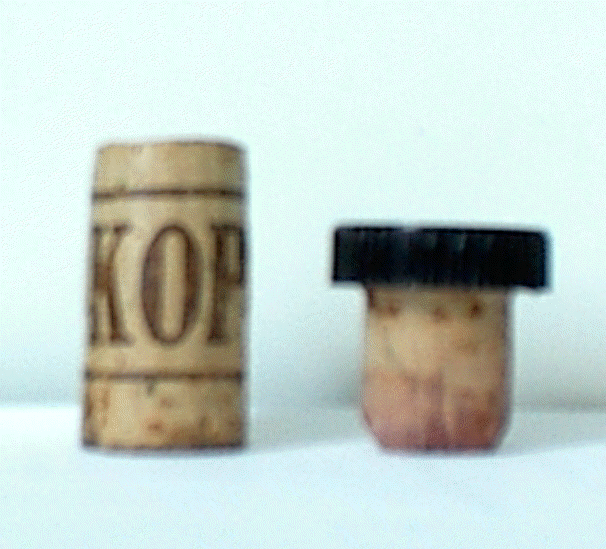www.infoportwine.com
To store or not to store?
28/07/01.
Changed 07/09/02;01/11/03;06/12/03;03/01/07;15/03/08.
REGISTER
FOR NEWSLETTER.
Only unfiltered bottled Port types are meant to be stored. These are the
Vintage and Crusted, but also unfiltered bottled (Ruby-)Reserve/Vintage Character (VC) and
Late Bottled Vintage (LBV) (see also: Files/Types 1d).
All other types are first stabilized and filtered. As a result
they do not become better in the bottle. They are at their top and at best
remain there, but the risk exists that they become worse. This is not different
even when they are sealed by a driven cork (see below).
That is why a storage advice of sometimes 10 or 20 years for old Tawnies
or Colheitas is so dangerous. You have to know exactly what has happened to a
certain lot before purchase and you must have ideal storage circumstances, but
even than it can be a gamble. At least you should possess a large quantity of
one lot and taste regularly (call us if you need any help). But it remains risky.
The IVDP - Instituto dos Vinhos do Douro e do Porto (formerly IVP) – advises on its website to consume
these wines ”within the first years after bottling”. In spite of this
João Paulo Martins and James Suckling have written about good experiences with long times stored Colheitas and Aged Tawnies
(see also Files/Types 6a).
 A
distinct aid to the answer to the question To store or not to store? is the cork.
Storage Ports have a long driven cork, which can only be removed by use
of a corkscrew. Such a cork makes them suitable to be stored lying down. Ports
that are meant to be drunk promptly have a stopper cork. This is a
short cork with a plastic hat, which can be removed by hand. Bottles with a
stopper cork are meant to be stored standing up.
A
distinct aid to the answer to the question To store or not to store? is the cork.
Storage Ports have a long driven cork, which can only be removed by use
of a corkscrew. Such a cork makes them suitable to be stored lying down. Ports
that are meant to be drunk promptly have a stopper cork. This is a
short cork with a plastic hat, which can be removed by hand. Bottles with a
stopper cork are meant to be stored standing up.
The
question of how long storage Port can or must be laid up cannot be
answered easily. It
is good to know that the development in the bottle will be less strong according
to the wine having stayed longer in casks (Vintage ca. 2-3 years; Crusted ca. 3
y. and LBV ca. 4-6 y.).
In addition storage times are mainly dependent on the vintage year and the
quality of the producer. Not every Vintage by far is suitable for storage of 20
years or more. But Vintage opened too early may still be ”closed” and have
even less smell and taste than a simple Ruby (then consider double decanting,
see Files/To store ... 3). It is absolutely necessary that
you make a thorough inquiry into the opinions of different observers and not
only trust the advice of your wine trader.
Finally the storage history of a bottle is a very important factor. There are
wines those have been stored very cool and have never been transported in 40
years those seemed not to be over five years old. And others those wandered over
the world and were over their top much too early.
As
soon as bottles have been opened, Port is meant to be kept for a limited
time only. Young Tawny and filtered bottled Ruby, (Ruby-)Reserve and LBV will stay good for 3
or 4 weeks. They can be closed with their original stopper cork. After the first
glasses have been drunk young Port often becomes softer if it is then stored for
some days.
For Tawny with indication of age and Colheita the risk of deterioration is less, because these wines also come in
contact with oxygen during cask maturing. Sometimes you read about a storage
life of months.
Unfiltered bottled Port, and especially an older Vintage, may obviously
deteriorate already within one day.
Our opinion is that the best wines should be drunk on the day of opening.
Why would you take any risk with such an expensive product? Besides, this should
not pose too much of a problem, right? You are of course familiar with the
phenomena that: the better the Port, the smaller the bottle…
However professionals from producers, traders and restaurants often do not make
a problem of this. But mostly they have a stock and simply take an other bottle
if necessary. And that is not always possible for everyone at home. So please be
careful.
Copyright
© 2001-2011 infoportwine
All rights reserved.
 A
distinct aid to the answer to the question To store or not to store? is the cork.
Storage Ports have a long driven cork, which can only be removed by use
of a corkscrew. Such a cork makes them suitable to be stored lying down. Ports
that are meant to be drunk promptly have a stopper cork. This is a
short cork with a plastic hat, which can be removed by hand. Bottles with a
stopper cork are meant to be stored standing up.
A
distinct aid to the answer to the question To store or not to store? is the cork.
Storage Ports have a long driven cork, which can only be removed by use
of a corkscrew. Such a cork makes them suitable to be stored lying down. Ports
that are meant to be drunk promptly have a stopper cork. This is a
short cork with a plastic hat, which can be removed by hand. Bottles with a
stopper cork are meant to be stored standing up.